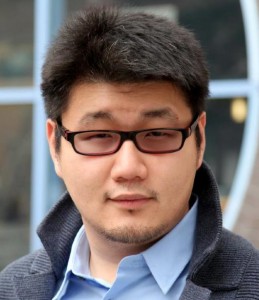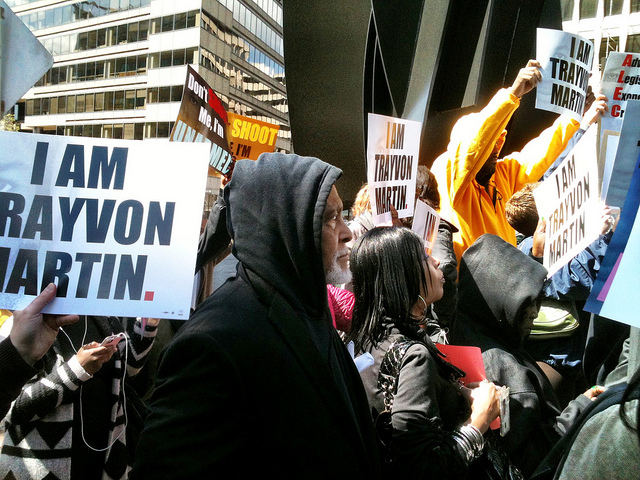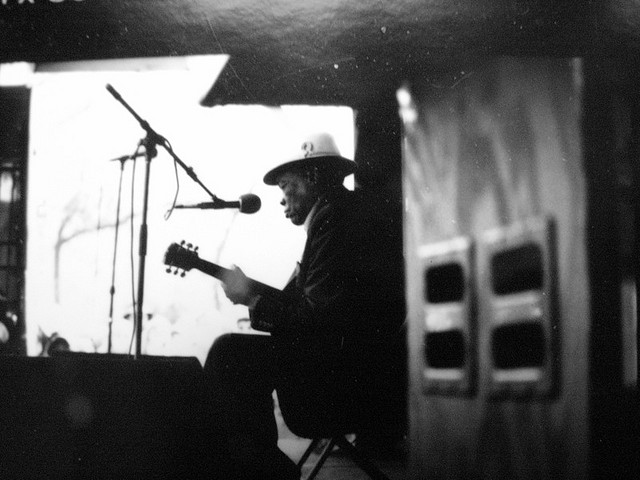Bill Cheng, Anthony Marra, and the freedom to write what you don’t know.

September 19, 2013
In Lorrie Moore’s short story “Agnes of Iowa,” Agnes, a white teacher, stays after class one evening with Christa, her only black student, to talk about Christa’s creative work. Agnes finds Christa “smart and funny,” Moore writes, and enjoys chatting with her about her writing.
Tonight, Agnes had decided to talk Christa out of writing about vampires all the time.
“Why don’t you write about that thing you told me about that time?” Agnes suggested.
Christa looked at her skeptically. “What thing?”
“The time in your childhood, during the Chicago riots, walking with your mother through the police barricades.”
“Man, I lived that. Why should I want to write about it?”
Agnes sighed. Maybe Christa had a point. “It’s just that I’m no help to you with this vampire stuff,” Agnes said. “It’s formulaic, genre fiction.”
“You would be of more help to me with my childhood?”
“Well, with more serious stories, yes.”
Christa stood up, perturbed. She grabbed back her vampire story. “You with all your Alice Walker and Zora Neale Hurston. I’m just not interested in that anymore. I’ve done that already. I read those books years ago.”
“Christa, please don’t be annoyed.” ….
“You’ve got this agenda for me.”
“Really, I don’t at all,” said Agnes. “It’s just that—you know what it is? It’s that I’m just sick of these vampires. They’re so roaming and repeating.”
“If you were black, what you’re saying might have a different spin. But the fact is, you’re not,” Christa said, and picked up her coat and strode out—though ten seconds later, she gamely stuck her head back in and said, “See you next week.”
Professional writers are, perhaps, no better off than Christa; audiences and critics sometimes play the role of Agnes, preferring that we remain native informants, despite our other interests. And we, too, are sometimes forced to stick our heads back through the doorway and say, “See you next week.” There’s a power dynamic at work here.
But as Christa suggests with her “Why should I want to write about it?” and as Agnes quietly admits, writers write for different reasons—and some are not interested in writing about versions of themselves. A certain kind of writer revisits and reinvents the old; another chooses to explore what is entirely new. Many writers will, in their careers, do both. But who finds it easiest to open the door to the latter category? In a recent piece for PolicyMic, “The One Thing White Writers Get Away With, But Authors of Color Don’t,” Gracie Jin argues that “[i]n a society masquerading as post-racial, it is still only the white man who can speak authoritatively for every man. People of color, on the other hand, are expected to speak only for themselves.”

She’s talking about what’s happening to Chinese-American, Queens-raised author Bill Cheng in the wake of the release of Southern Cross the Dog, his debut novel, which takes place in the Mississippi Delta during and after the Great Mississippi Flood of 1927. She compares the scrutiny Cheng has faced in writing what he doesn’t know to the leeway given Adam Johnson, who researched North Korea to write the Pulitzer Prize-winning novel The Orphan Master’s Son. Not so shockingly, Johnson, who as Jin notes is “plain old American,” comes out way ahead.
But as Jin observes, Johnson’s rather further along in his career than Cheng. Not convinced that Cheng’s being treated unfairly? Take a look at another example: how The New York Times portrayed Cheng and Stegner Fellowship wünderkind Anthony Marra, the author of the extraordinarily well received debut novel A Constellation of Vital Phenomena. Marra’s novel is set in 2004, during the second Chechen War, and flashes back to the first war, in 1994. The Times ran an article about Marra in May, the same month it ran a piece featuring Cheng. When the pieces came out, Cheng had never been to Mississippi, and Marra had been to Chechnya only once, just prior to going over the final draft of his book.
I read the articles having not read the novels, though I plan to pick up both. And I read with particular interest; I write fiction using a boatload of research, and I’m curious about how readers, journalists, and critics perceive and credit that approach when it’s obvious that a story is coming from something other than experience. The two stories provide an unusual case study, because the writers have certain similarities: not only do Marra and Cheng have nearly analogous relationships to their subject matter, but both are American men in their late 20s who graduated from top writing programs. And their books came out around the same time. But the Times treats them strikingly differently: Marra receives accolades for writing through research, while Cheng has to earn his way past suspicion.
I chose the appellations above (Marra’s Wallace Stegner Fellowship at Stanford; Cheng as a Chinese-American from Queens) from the credentials the Times elects to cite first. The initial mention of Marra’s Stegner affiliation comes as an aside late in Charles McGrath’s story. But before that, Marra is quoted directly and at some length about his experiences researching his book: “Research is not an obstacle, something to be frightened of… It can be one of the real joys of writing. Someone once said, ‘Don’t write what you know, write what you want to know.’” Eventually, we hear about his family and his years growing up in Washington, D.C., but the meat of the story is not his background—it’s his brain and his opinions about writing. When he’s given room to sound off on research and its joys, the Times is sending us a subtle signal that he’s an expert worth hearing. We even get a short history of how his writing developed, and a glimpse of an unpublished novel. When he’s so deeply fleshed out, and speaks for himself, I don’t have to leap a big imaginative chasm to think of him caring about something other than his own life. I have a real sense of what he observes, and what interests him.
Julie Bosman’s piece featuring Cheng, by comparison, marks his ethnicity and childhood home right off the bat, in the second paragraph, and co-signs onto a tone of skepticism about the whole enterprise of his novel: “It’s no wonder the Southern literati have raised an eyebrow at its author: Bill Cheng, a 29-year-old Chinese-American from Queens who has never set foot in Mississippi.” While McGrath’s article about Marra lets him speak first, and talk about his research in relation to his work, the piece about Cheng quotes a bookseller first. The story isn’t about what kind of writer Cheng is, or how he thinks about craft—it’s about what others think of Cheng’s work, and how he reacts to that.
“I was highly suspicious of this book when I first started it,” said Richard Howorth, the owner of Square Books in Oxford, Miss., and a revered authority on Southern literature. “I was won over.”
The article quotes three booksellers, in fact; Howarth was “suspicious,” the second was “questioning,” and the third “said that she believed that Mr. Cheng had ‘transcended’ his own background to write the book.”

While Cheng’s background is an obstacle, something he has to “transcend,” and his writing subject to a series of interrogations, Marra’s background is nearly irrelevant, his achievement inarguable. Marra is cast as a young master while Cheng steels himself for scrutiny and suspicion. Marra, a white American male, is barely a foreigner in Chechnya, and we hear nothing about whether Chechens have read his book, or what they think of it; Chinese-American Cheng is a foreigner in another part of his own country, and we hear more from other readers and booksellers than we do from him. If the booksellers are speaking in coded language about Cheng’s “otherness,” that goes unremarked. Marra’s work is “acclaimed” from sentence one, while Cheng’s novel’s superlative reviews aren’t mentioned until later. Talented Marra has worked and grown to become the writer he is today; talented Cheng, it would seem, has simply and exotically manifested. It’s supposed to be hard to imagine him writing about the South.
In fact, with what we have in this article, it’s hard to imagine him at all. As Jin asks, who has permission to research, to be an outsider, to be authentically inauthentic? The Cheng profile quotes a bookseller speculating about how Cheng managed the feat of writing Southern Cross. “He must have done a ton of research or has read a lot of Faulkner,” she says. Why are we guessing? The only phrase that hints at his method: “he drew from his deep knowledge of the blues to write the novel.” His research remains mysterious, nearly unknowable, as Cheng’s voice is drowned in a flood of opining others. When Cheng is quoted, he’s put on the defensive, and notes his status as an outsider: “I don’t have the advantage of being from there, from that region, of that race… It’s tough. But my responsibility is to tell stories, to tell the story I want to tell in the way I want to tell it. And if there are repercussions from that, I’ll just have to face it.”
Indeed. And some of the repercussions may be in the subtly racialized coverage that has one piece quoting a variety of people asking how he did it—and the other article actually getting to the answer. I wondered if I was the only one seeing this Grand Canyon separating the two stories, but when I Tweeted the two links together in June, other writers raised electronic eyebrows. One person I discussed this with offered various explanations, counterarguments and speculations: Mississippi is in the U.S., and, after all, far easier to get to than Chechnya; publishing marketing material may have landed heavily on Cheng’s ethnicity. The first argument made more sense to me than the second. Should journalists leap onto marketing bandwagons so swiftly? Why is Bill Cheng, a minority, so “suspicious” when he is interested in something not ostensibly himself? How very strange, an American writer choosing to locate himself in regional American literature and history that interests him! It’s as if no one has ever picked up The Red Badge of Courage.
In Cheng’s case, connecting author biography to fictional material throws into sharp relief the question of where an Asian-American voice belongs in a region that’s long been defined in terms of black and white—and the tiresomely pertinent question of who is American. Is the concern that Bill Cheng had never been to Mississippi when he wrote his book, or that people cannot easily imagine an Asian-American living in, writing about, or caring about the South? Must that burden be Bill Cheng’s—or should it, perhaps, belong to Agnes?



